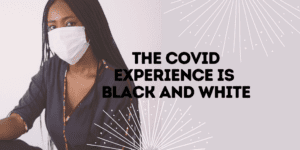News
The COVID Experience is Black and White

Written by Hena Naghmi, Strategy Consultant
RedSky Strategy has conducted a third wave of our proprietary COVID study seeking to understand how consumer attitudes and behaviors are evolving with the pandemic. This particular iteration of the survey coincided with the first set of Black Lives Matter protests. We know that the pandemic has had a disproportionate effect on Black people in America. This has been well-documented. And we know that Black people’s experience in this country is different than white people’s. This has also been well-documented. We wanted to better understand how Black Americans are experiencing this particular moment, fraught with increasingly current and public exacerbations of age-old concerns around systemic racism and oppression in the context of an unprecedented pandemic.
What we found is that Black people are much more anxious about this moment, less optimistic, and more realistic than their white counterparts. When asked whether this is the right time to reopen the country, over half of Black Americans surveyed (53%) indicated it is not the right time. Less than a third of white Americans (32%) feel the same way. Similarly, more than half of Black folks (51%) feel that the Coronavirus is still a threat, while only about a third of white folks (34%) agree. We see again that Black people’s experience of the pandemic is different than that of white people’s. Where white folks are optimistic, Black folks tend to be anxious.
This same dynamic was evident when we asked people to think about the future. Whereas less than a quarter of white people (24%) believe that the way they live their lives will be different once the pandemic is over, more than half of Black people (54%) believe their lives will be different. This underlines a consistent theme in American history. White folks in America have overwhelmingly enjoyed the maintenance of a status quo that has inherently retained their privilege. Whether consciously or not, white people are used to things going “back to normal” for them. Black folks, on the other hand, have fought against that same status quo. Where hard-fought changes have been won, Black people have always known the reality of having to adapt to back-sliding or shifts in interpretations of laws that might leave them less enfranchised or entirely disenfranchised.
These racial inequities our society was built upon have left Black people with less optimism and more realism when it comes to how macro shifts can affect their individual, day-to-day lives. Black folks are already taking more actions to help prepare themselves for the new reality post-pandemic. Our study found that Black Americans are using telehealth resources and self-care techniques at a higher frequency than white Americans (22% vs. 15%).
We are all struggling under the reality of this pandemic, and the uncertainty of its duration and ultimate impact. It would do us well, however, to remember that the way in which we struggle is not always the same. There has never been a singular American experience. And it seems clear that there is not a singular COVID experience, either — which is why we should continue to approach each other with empathy and an intent to understand. While we may never truly understand each other’s experiences, trying is the only way we can come close.
These findings are from the new national survey that ran from March 30 through June 5 in order to better understand the impact of the Covid19 pandemic. Comprised of a representative sample of the US population, including approximately equally amounts of women and men and spanning ages 18-65+, the survey aimed at uncovering people’s attitudes during and about the pandemic by asking questions around self-assessed mental and physical health, cannabis/CBD consumption, consumer behaviors, and more.
